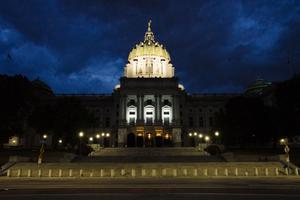Spotlight PA is an independent, non-partisan newsroom powered by The Philadelphia Inquirer in partnership with PennLive/The Patriot-News, TribLIVE/Pittsburgh Tribune-Review, and WITF Public Media. Sign up for our free newsletters.
HARRISBURG — As state legislative races go, the one between Republican Sen. John DiSanto and Democrat George Scott was one of the most hotly contested in Pennsylvania’s November election.
The Dauphin County matchup was key to Democrats’ hopes of wresting control of the chamber from Republicans for the first time in more than 25 years, an effort that ultimately failed.
And it was an all-out political brawl. DiSanto and Scott spent weeks attacking each other’s policies in a barrage of mailers and television ads. In the closing days of the election, a 15-second anti-Scott ad hit the airwaves, paid for by the Washington, D.C.-based Republican State Leadership Committee.
Direct coordination between groups like the RSLC, which run so-called super PACs, and political campaigns is forbidden. To create the ad, the group turned to a middle-man, the same Harrisburg-based firm running DiSanto’s campaign: Red Maverick Media, headed by well-connected strategist Ray Zaborney.
No one has accused Zaborney’s firm or RSLC of wrongdoing. But good government and campaign finance experts said the arrangement is another example of how weak state and federal campaign finance rules — combined with meager oversight — create gray areas and loopholes.
Zaborney, for his part, said he and his company comply with the law and pointed to federal rules that give some breathing room for firms like his to work both for candidates and outside groups with an interest in the same election
“I’m not a campaign attorney, but I follow what mine tell me to do,” Zaborney said.
Earlier this year, Spotlight PA and The Caucus reported that a dark money group Zaborney helped launch held an exclusive California fundraiser headlined by the Senate’s top Republican, Jake Corman of Centre County. Zaborney has also run Corman’s campaign for years, but said there was no coordination.
In the DiSanto race, state campaign finance records show RSLC paid Red Maverick nearly $300,000 in mid-October for television and digital advertising — the only independent expenditure it made in Pennsylvania between mid-September and mid-October.
The outside group also paid Red Maverick $30,000 in late October specifically for its work in placing an ad opposing Scott, according to paperwork submitted to the Pennsylvania Department of State, which oversees elections.
Zaborney acknowledged that RSLC and DiSanto’s campaign are both clients of his company. But he said there is a “firewall,” consistent with federal law, between the firm’s work for DiSanto and its work for the leadership committee. He said his firm has written policies that clearly spell out how the firewall works, and his staff is trained to abide by it.
“I was on the campaign side,” Zaborney said. “That means another consultant handled the ads, placement, etc., and I had no knowledge of the content, placement, amount spent, etc.”
That other consultant, Red Maverick co-founder Mike Leavitt, echoed Zaborney’s comments, saying there was no coordination. Republican State Leadership Committee officials did not respond to numerous requests for an interview.
The ban on coordination between outside groups like RSLC and traditional political campaigns stems from a landmark campaign finance decision a decade ago by the U.S. Supreme Court. The case, known as Citizens United, effectively allowed corporations and other outside groups to make unlimited contributions, reversing decades of restrictions on giving.
The rationale behind the decision was that limiting independent spending from corporations and other groups would violate the First Amendment. The assumption was that independent spending cannot be corrupt because it is not coordinated with the political campaigns of specific candidates, according to the Brennan Center, a nonpartisan law and policy institute.
“The entire point of that decision is that spending by these groups would be independent,” said Robert Maguire, research director for Citizens for Ethics and Responsibility in Washington, a nonpartisan accountability organization. “In reality, these outside groups become de facto extensions of the campaigns they are supporting because of the lax coordination rules.”
The Supreme Court’s ruling ushered in a wave of super PACs like those run by RSLC.
It also gave rise to so-called “dark money groups,” which set up as nonprofits and operate with little transparency, not even having to disclose the names of their donors. Often, they give large sums of money to super PACs, which in turn make independent expenditures (usually television, radio, and mail ads) to support or oppose a candidate.

In Pennsylvania this year, both Democratic and Republican-leaning outside groups spent millions of dollars to support candidates through independent spending on advertising.
Scott, whose campaign raised and spent more than $2.5 million in his losing race, was one of the beneficiaries on the Democratic side. Groups like Conservation Voters of Pennsylvania and the Service Employees International Union independently paid for ads to support him.
Pennsylvania Fund for Change, a super PAC funded by a dark money group, spent more than $7 million to help legislative Democrats — including at least $470,000 in television ads for Scott, according to campaign finance reports and Advertising Analytics.
There is no evidence the people running Scott’s campaign, or producing his ads, also worked for any of those outside groups.
RSLC, meanwhile, invested more than $2 million to help Republicans maintain control in both the 203-member state House and the 50-member state Senate.
The bulk of its spending in the state, about $1.7 million, went toward state House races — mostly in the form of direct contributions to the House Republican Campaign Committee, the political arm of the House GOP. State campaign finance records, as well as filings with the Internal Revenue Service, trace the money back to large contributions from corporations and billionaire Republican donors like Sheldon Adelson and members of U.S. Education Secretary Betsy DeVos’ family, along with small donations from across the country.
Tracking who is behind the money RSLC spent to produce the ads for DiSanto’s campaign is harder. That is because the money flowed through a different political arm of RSLC — a so-called “independent expenditure” group, or super PAC, whose donations are more difficult to trace.
According to campaign finance filings, Zaborney’s Red Maverick Media was the only Pennsylvania firm RSLC paid to produce and run ads in the state this year.
On Oct. 14, the Republican committee paid Red Maverick a total of $297,495 for the purpose of television and digital advertising. On Oct. 27, it paid out another $29,709 to Zaborney’s firm for television ads, according to the filings.
Data from the firm Advertising Analytics shows RSLC spent about $77,000 on a Pittsburgh-area Senate district that Republicans flipped and about $91,000 on a Senate district in Lancaster County that the GOP held. The group spent roughly $142,000 in DiSanto’s district, which covers parts of Dauphin and Perry Counties in Central Pennsylvania.
The television ads in the DiSanto race, paid for by RSLC, aired nearly 4,400 times on cable channels — from CNN and Fox News to Lifetime and Hallmark — during the last four weeks of the campaign, according to a contract available through the Federal Communications Commission.
At the same time, Red Maverick was serving as DiSanto’s chief campaign consultant — receiving just over $1.2 million from the campaign in 2020.
Zaborney noted his work for DiSanto centered around ads that attacked Scott over a controversial photo, among other things. In contrast, Zaborney said his firm’s work for RSLC honed in on Scott’s record on taxes and fiscal issues.
Maguire, of Citizens for Ethics and Responsibility, said the “firewall” argument is a common one across the country — though political operatives note that it usually involves large firms with hundreds of employees, rather than smaller ones like Red Maverick, which lists 10 employees on its website.
Maguire said because of nearly non-existent enforcement of the ban by the Federal Elections Commission, it’s extremely difficult to uncover or prove illegal coordination unless there is access to internal campaign documents.
“That is why it has become so easy for outside groups to essentially become an extension of the candidate they support,” Maguire said.
100% ESSENTIAL: Spotlight PA relies on funding from foundations and readers like you who are committed to accountability journalism that gets results. Become a member today at spotlightpa.org/donate.
